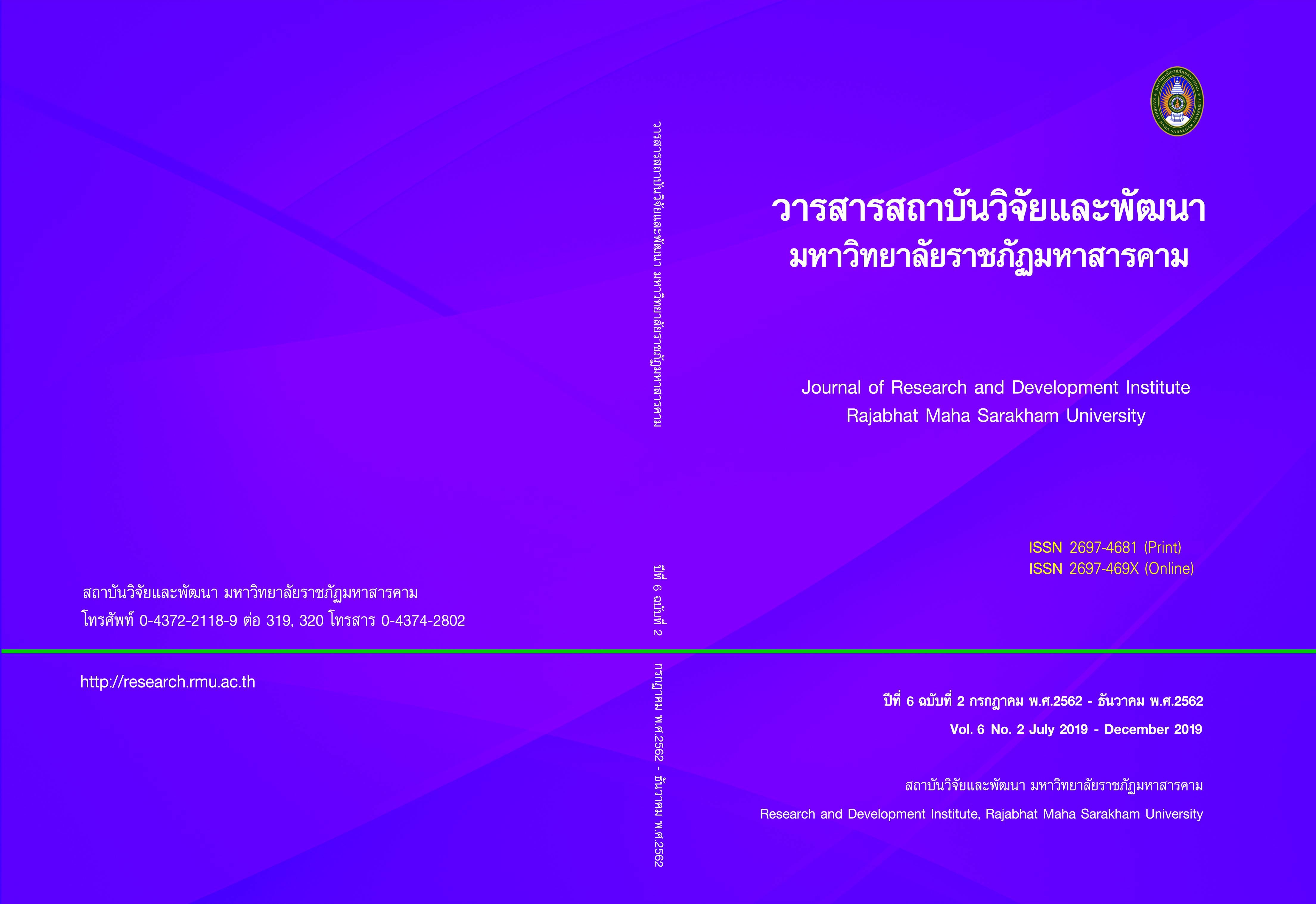Development of Training Program for Preventing Bad -Purpose Internet of Students in Mathayomsuksa 4
Keywords:
Training Program, Self-awareness, Internet for the Bad PurposeAbstract
The purposes of this study were to 1) create and develop and test the program for self-awareness of using the internet for the bad purpose of Matthayomsuksa 4 students 2) study the result of the program for senior high-school students. The samples of this study were 35 students of a class studying in Matthayomsuksa 4 of Prajacksilapakarn School in the semester 2 of the academic year 2018. They were selected though cluster-random sampling method. They had joined the trainings for 17 times. The research instruments used in the study were the program for self-awareness of using the internet for the bad purpose of senior high-school students and the test of self-awareness of using the internet for the bad purpose containing 40 questions. The test has scale with discriminating power ranging 0.313 - 0.708 and a reliability of 0.980 The statistics used for analyzing the collected data were mean, standard deviation, and One-way repeated measure MANOVA. The study showed that
- The developed program has 17 activities and takes 8 weeks (2 hours a week) The program for self-awareness of using the internet for the bad purpose of senior high-school students was evaluated by the five experts, and its quality (IOC) was at best level.
- The students who had joined the training and the follow-up program had the post-test score higher than the pre-test at the 0.01 level of significance. The students who joined the program had the endurance of knowledge in conclusion.
References
Ekkatanan Boribarn. (2014). Development of the Program to Promote the Self-Efficacy of Successful Experiences by Role Play Techniques of Prathom 5 students. Master of Education (Educational Research and Evaluation) : Mahasarakham University. [In Thai].
Electronic Transactions Development Agency (Public organization) Ministry of Digital Economy and Society. (2019).
Report of the internet user behavior survey in Thailand 2018 : Thailand Internet User Profile 2018. Bangkok : Ministry of Digital Economy and Society. [In Thai].
Napaporn Mutponhthaworn. (2002). Risk perception and safety behavior of construction workers in Bangkok metropolis. Master of Science Thesis Kasetsart University. [In Thai].
Nitchapak Anothip. (2013). The Effect of Perceived Risk Consumer Patronage in Online Shopping : Facebook. Bangkok : Stamford International University. [In Thai].
Paul Slovic. (1987). “Perception of Risk,” Science, 236 : 236-85
Prathum Suthamma. (2009). Internet usage behavior of upper secondary school students of Howong School. Special problems (general management), Master of Public Administration Degree Program. College of Public Service Burapa university. [In Thai].
Rangsan Chomya. (2010). Basic Psychology : Fundamentals in Understanding Human Behavior. 2nd edition. Mahasarakrm university. [In Thai].
Rothwell, W., and P. Cooksoon. (1997). Beyond Instruction : Comprehensive Program Planning for Business and Education. San Francisco : Jossey-Bass.
Udon Thani Provincial Police Station. (2018). Daily Report Book about Lawsuits 2016-2017. Udon Thani : Udon Thani Provincial Police Station. [In Thai].
Yupalak Khejornrak. (2014). “The development of Education Program to Promote the Ability to Think Critically of the End of Grade : Mixed Methodology Research”. Journal of Educational Management, Mahasarakrm university, 20 (2) : December 2014. [In Thai].
Downloads
Published
How to Cite
Issue
Section
License
Articles that are published are copyrighted by the authors of the articles







